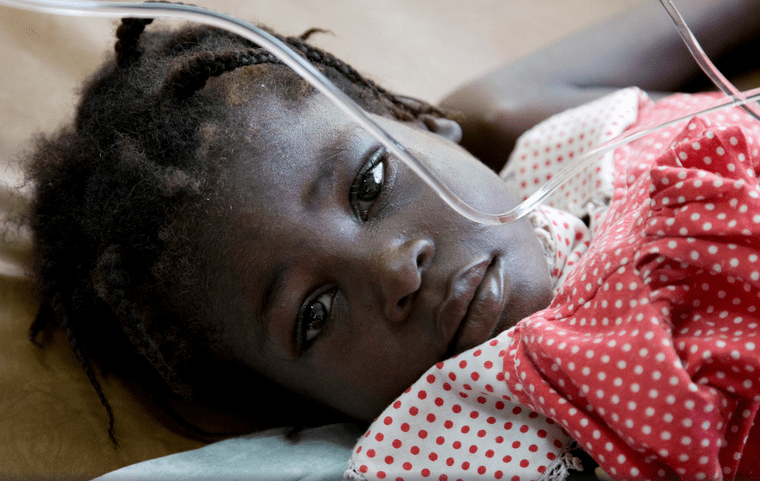Advertisement
Outbreak On Trial: Who's To Blame For Bringing Disease Into A Country?

By Richard Knox
If an international agency introduces a devastating disease to a country, should it be held accountable?
That’s the big question at the heart of a court proceeding that gets underway next Thursday. The international agency is the United Nations. The disease is cholera. And the nation is Haiti.
Four years ago this month, thousands of Haitians downstream from a U.N. peacekeeping encampment began falling ill and dying from cholera, a disease not previously seen in Haiti for at least a century.
Since then cholera has sickened one in every 14 Haitians — more than 700,000 people; and over 8,000 have died. That's nearly twice the official death count from Ebola in West Africa thus far.
A year ago, a Boston-based human rights group sued the U.N. for bringing cholera to Haiti through infected peacekeeping troops from Nepal, where the disease was circulating at the time. The U.N. camp spilled its sewage directly into a tributary of Haiti’s largest river.
There’s little doubt that the U.N. peacekeepers brought the cholera germ to Haiti. Nor is there argument over the poor sanitary conditions at the U.N. camp.
When I visited the scene in 2012, it was plain how untreated sewage from the camp could easily contaminate the Meille River that runs alongside before it spills into the Artibonite — Haiti’s Mississippi — which provides water for drinking, washing and irrigation for a substantial fraction of the country’s population.
The smoking gun, scientifically, is a molecular analysis of the Haitian cholera bug compared to the Nepalese strain from the same time period. It showed the two differ in only one out of 4 million genetic elements.
“That’s considered an exact match, that they’re the same strain of cholera,” Tufts University environmental engineer Daniele Lantagne told me last year.
She’s one of four scientists appointed by the U.N. to investigate how cholera got to Haiti.
But next week’s proceedings, in the U.S. District Court of Judge J. Paul Oetken in New York City, will not deal with those facts, and how they point to the U.N.’s responsibility for bringing cholera to Haiti. The only issue for now is whether the U.N. can be sued — or if it enjoys absolute immunity.
At a time when nations and U.N. agencies are being criticized for not doing enough to quell the burgeoning Ebola epidemic, the cholera suit may have special resonance.
The U.N. is not commenting on the suit. “We don’t make comments on ongoing cases,” says Matthias Gillmann, a spokesman for U.N. Secretary General Ban Ki-Moon.
Gillmann says the agency hasn’t commented on the matter since it announced last year that claims for compensation filed by Haitian cholera victims “were found not receivable.”
However, the U.N. has been deploying a public relations strategy to defuse Haitians’ anger about cholera. Last July Ban Ki-Moon made what he called a “pilgrimage” to a cholera-stricken family in Haiti and said he was “very much humble and sad to have seen all this tragedy that has been affecting many Haitian people.”
Ban also said the U.N. “has a moral duty to help those people to stem the further spread of cholera,” although the agency has been able to raise only about $26 million out of the $2.2 billion it says will be needed to bring clean water and sanitation to Haiti.
The U.N.’s surrogate in this legal battle is the U.S. government. In a legal brief filed in July, U.S. Attorney Preet Bharara argued that the U.N. and its officials are totally immune from lawsuits, no matter what harm may arise from its activities, such as peacekeeping missions.
“The U.N. has repeatedly asserted its immunity,” Bharara wrote Judge Oetken. “Plaintiffs have not presented — and cannot present — any evidence to the contrary.”
Of course, the plaintiffs see it very differently. They’re represented by Dorchester-based Institute for Justice and Democracy in Haiti and its sister group Bureau des Avocats Internationaux. Their lawsuit demands that the U.N. pay for an adequate water-and-sanitation system for Haiti, the only sure way to end the cholera epidemic, and to compensate cholera victims.
Brian Concannon of the IJDH says the U.N.’s immunity is limited. He says it’s supposed to have a mechanism to compensate those injured by its actions — which might cover such things as sexual assault by peacekeeping troops, or property damage, as well as the introduction of lethal diseases.
That mechanism is called a Standing Claims Commission, which would resolve disputes over damage claims.
“The U.N. has never set up a Standing Claims Commission in 60 years of peacekeeping missions,” Concannon said in an interview.
His group petitioned the U.N. in 2012 to set up such a commission to address cholera claims. But as the secretary-general’s spokesman says, the U.N. found those claims “not receivable,” which provoked the current lawsuit.
Despite the opposition of the U.S. government, Concannon says he’s optimistic. For one thing, Judge Oetken didn’t have to schedule a hearing at all. “The safe route for the judge would be to say, ‘I’m going to defer to the government and dismiss the case,’” Concannon says. “The fact he granted our request for a hearing is a sign the court is taking this seriously.”
In addition, the judge has opened the hearing to outside “friend of the court” parties — groups of international legal experts who support the plaintiffs’ claims. “It’s unusual that the judge made such a broad invitation,” Concannon says. “We think it’s a sign he’s interested in these issues.”
Manfred Nowak, a professor of international law and human rights at Stanford University and a former U.N. Special Rapporteur on Torture, signed one of those amicus briefs. “The U.N. needs to understand,” Nowak says, “that immunity cannot mean impunity.”